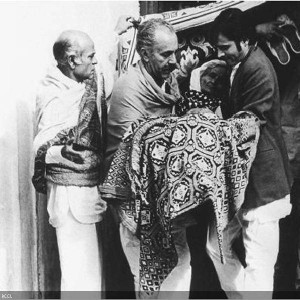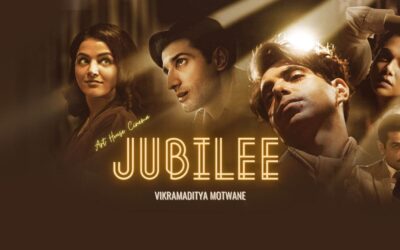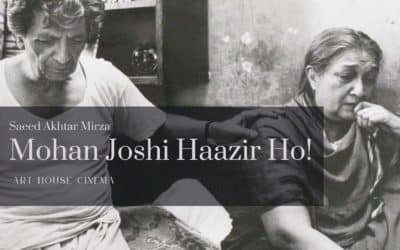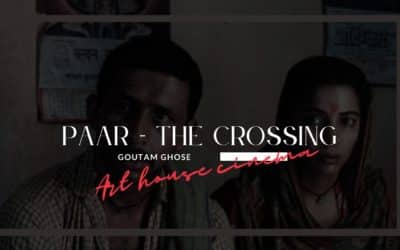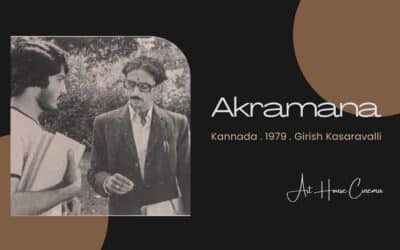Garm Hava (Garam Hawa) (Eng: Scorched Winds) is a 1973 Hindi film directed by M.S. Sathyu. It is based on an Urdu short story by Ismat Chughtai with a screenplay by Kaifi Azmi. The film deals with the struggles of a Muslim family in the aftermath of partition, in a country which was their own. It remains as one of the most remarkable films on the partition of India.
Cast
- Balraj Sahni —————————– Salim Mirza
- Farooq Shaikh ————————- Sikandar Mirza
- Dinanath Zutshi ———————–
- Badar Begum ————————– Salim’s Mother
- Geeta Siddharth ———————- Amina Mirza
- Jamal Hashmi ————————- Kazim
- A. K. Hangal ————————— Ajmani
- Jalal Agha ——————————- Shamshad
Story
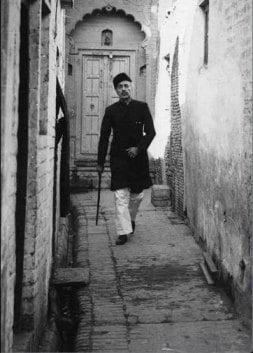 Garm Hava is the story of the Mirzas, a well to do Muslim business family in the city of Agra, in the United Province of undivided India. The country has just been divided and the dust of partition has not settled down yet. The family is headed by two brothers, Salim and his elder brother Halim. While Salim takes care of the family business, Halim is involved in politics and is a leader of All India Muslim League. Salim has two sons, elder Baquar who helps with business and younger Sikandar who is a student. Salim’s daughter Amina is engaged to be married to Halim’s son Kazim.
Garm Hava is the story of the Mirzas, a well to do Muslim business family in the city of Agra, in the United Province of undivided India. The country has just been divided and the dust of partition has not settled down yet. The family is headed by two brothers, Salim and his elder brother Halim. While Salim takes care of the family business, Halim is involved in politics and is a leader of All India Muslim League. Salim has two sons, elder Baquar who helps with business and younger Sikandar who is a student. Salim’s daughter Amina is engaged to be married to Halim’s son Kazim.
Though Halim has proclaimed that he will stay in India to take care of the welfare of Muslims, he quietly migrates to Pakistan with his family. Salim Mirza refuses to leave the land of his forefathers. As a result of this, Amina and Kazim’s marriage is put on hold. In the aftermath of the partition and the changing scenarios, his business suffers and he is forced to vacate his ancestral house which was in Halim Mirza’s name and has now become evacuee property. Salim’s mother is unable to face this shock and dies as a result of a stroke. Disillusioned, Baquar also migrates to Pakistan while Salim lives on as a petty shoemaker. Kazim is not able to return to India and Amina accepts the proposal of Shamshaad, the son of Salim’s brother in law. However, Shamshaad to migrates to Pakistan and his marriage gets fixed there. Heartbroken for the second time, Amina commits suicide leaving the family devastated.
Amidst all these problems, Salim Mirza is accused of acting as a Pakistani spy. Although he is acquitted by the court, he is boycotted by the people and shunned by people who were once close to him. Finally, he decides to leave India and go to Pakistan, much against the wishes of Sikandar. As the family goes towards the railway station, they come across a big group of protesters taking out a procession against unemployment and discrimination. Salim encourages Sikandar to join the protest march and asks the tangawala to turn back the carriage towards his home. The credits roll with Salim Mirza joining the protest himself.
Commentary
Garm Hava is a difficult watch, not because the movie is slow or not well made, but because while watching the film, one has to bear the regret and feeling of guilt that so much went wrong and we could not do much about it. The beginning credits of the film set a definite premise for the film, starting with images from the freedom movement and then moves towards the leaders of Indian National Congress and Muslims League, advancing to photographs from the partition and the violent aftermath, stopping at the killing of Mahatma Gandhi. It is followed by a poem from Kaifi Azmi:
Taksin hua mulk toh dil ho gaye tukde; Har seene mein Toofan, wahan bhi tha yahan bhi
Har ghar mein chita jalti thi, lahraate the sholay; Har Shahar mein shmashan, wahan bhi tha yahan bhi
Geeta ki koi na sunta, na koi quran ki sunta; Hairan sa imaan, wahan bhi tha yahan bhiThe land is divided, lives are shattered; Storm rages in every heart; it’s the same here or there
Funeral pyres in every home, the flames mount higher; Every city is deserted, it’s the same here or there
No one heeds the Gital, no one heeds the Koran; Faith has lost all meaning; it’s the same here or there
While a sad Salim Mirza sees off his family members one by one, fleeing to Pakistan, he still has this belief in his heart that the martyrdom of Gandhiji will not go waste and the riots and communal frenzy will stop. The breaking down of his will owing to the changing times is a painful watch. As he loses his home and family members, we see his reflection in Amina as the father-daughter become two silent islands of pain. Amina is not able to survive the loss of her love, but Salim somehow lives on. As the situation becomes increasingly grave, the viewer can feel his torment and helplessness, for suffering in spite of his innocence.
Garm Hava managed to court a lot of controversy during the time of its filming. Taking offence is the favourite pass time of our country, this film was accused of instigating communal feelings and its shooting was disrupted by protests. However, the film went on to win the National Award for the best film on National integration. As M.S.Sathyu said himself, “What I really wanted to expose in Garm Hava was the games these politicians play…How many of us in India really wanted the partition. Look at the suffering it caused.”
In his effort to provide the story of the Muslims who chose to stay in India, Sathyu succeeded in creating a poignant tale. The details have been taken care of lovingly and the Agra of 1947 was recreated quite effectively. For Balraj Sahni, Garm Hava was a personal triumph; his performance as the angst-ridden but stoical Muslim man who refuses to let go is considered as the pinnacle of his acting, surpassing even Do Bigha Zamin. Incidentally the last lines he recorded for the film, “Insaan Kab Tak Akela Jee Sakta Hai?” were his last in any film (he died the next day after completing the dubbing for Garm Hava).
The film ends with these lines by Kaifi Azmi:
“Jo door se toofan ka karte hai nazara, unke liye toofan vahan bhi hai yahan bhi…
Daare me jo mil jaoge ban jaoge daara, yeh waqt ka ailaan vahan bhi hai yahan bhi”
Awards & Recognition
- Academy Awards (1974): Indian entry for Best Foreign Language Film
- Cannes Film Festival (1974): Nominated for Golden Palm
- Nargis Dutt Award for Best Feature Film on National Integration (1974)
- Film Fare Award for Best Dialogue, Best Story and Best Screenplay (1975)


